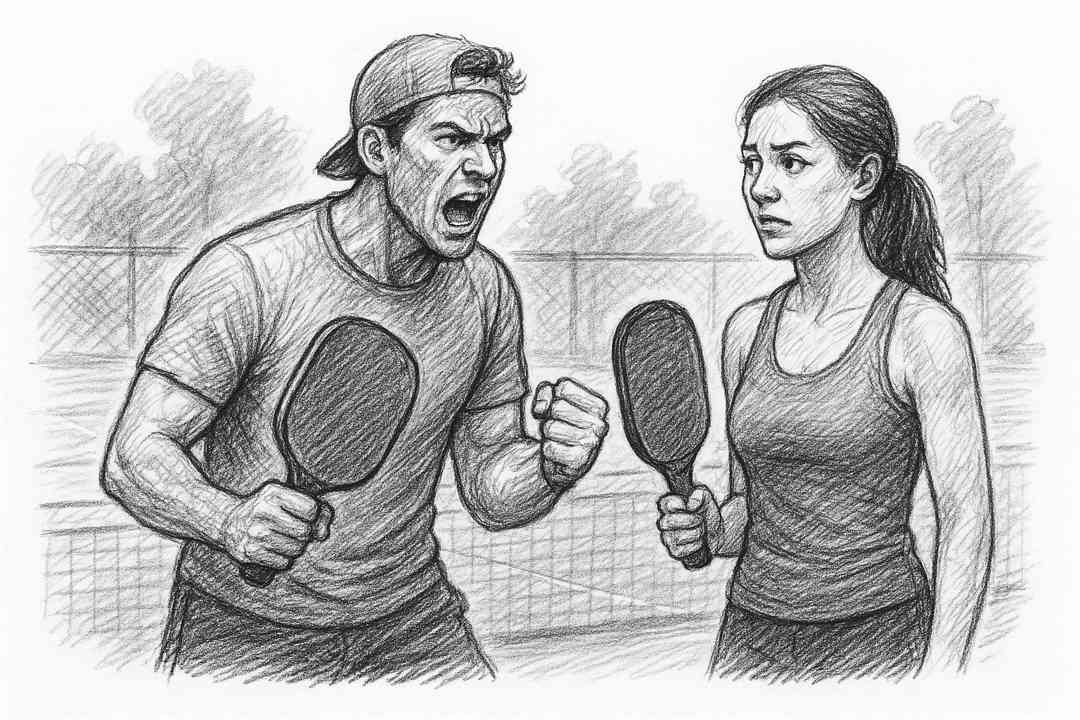Don’t Be That Player: A Pickleball Tale of Court Etiquette Gone Wrong
Pickleball’s charm lies in its community spirit, where players of all ages share the court with respect. But poor etiquette can turn a fun game into a frustrating one, as Jake, a fictional player, learned the hard way. Through his missteps—hogging courts, overpowering beginners, and staying silent in doubles—he discovered the unwritten rules that make pickleball a joy for everyone. In this Pikipedia tale, we’ll follow Jake’s journey, exploring three common etiquette mistakes, their impact on the court, and the lessons that transformed him into a player others admire.
A Tale of Court Etiquette
-
60% of players avoid courts with poor etiquette (Pickleball Union, 2025).
-
80% of pickleball games are doubles, requiring strong communication.
-
Seniors often feel intimidated by aggressive play, impacting their participation.
-
Paddle taps after games are a universal sign of respect in pickleball culture.
The Court Hog – A Lesson in Sharing
Jake arrived at his local court on a busy Saturday, eager to play. He and his partner won their first game to 11 points but stayed on for three more, ignoring the growing line of waiting players. A senior player, waiting for 30 minutes, finally spoke up, explaining that rotating after one game ensures everyone gets a chance. Jake felt embarrassed as others nodded in agreement—his actions had frustrated the community.
-
Etiquette Rule: Rotate after one game during busy times.
-
Impact: Court hogging delays access, especially for seniors who may have limited playtime.
Jake apologized, stepped off, and offered to join a round-robin, turning frustration into a shared laugh. Sharing the court isn’t just polite—it builds a welcoming space where every player feels valued.
The Smasher – Learning to Adapt
During his next game, Jake paired with a beginner, Sarah, who was still learning to dink. Eager to win, Jake smashed every shot, sending the ball flying past her before she could react. Sarah’s smile faded—she left the court feeling discouraged. A teammate pulled Jake aside, explaining that overpowering beginners can make them feel unwelcome, especially seniors trying the game for social fun.
-
Etiquette Rule: Adapt to your opponent’s skill level.
-
Impact: Aggressive play can intimidate, driving new players away.
Jake invited Sarah back, this time focusing on soft rallies to help her improve. She beamed after her first successful dink, and Jake realized that playing respectfully creates a court where everyone grows, fostering connections that make pickleball legendary.
The Silent Partner – Why Communication Matters
In a doubles match, Jake’s lack of communication caused chaos. As a ball flew toward the kitchen line, he and his partner both lunged, colliding and missing the shot. Their opponents scored, and tension rose—Jake hadn’t called “mine” or “yours.” In doubles, where 80% of pickleball games are played, clear communication prevents mishaps and builds trust. A quick chat with his partner revealed they’d both felt unsure without calls.
-
Etiquette Rule: Use clear calls like “mine” or “yours” in doubles.
-
Impact: Silence leads to errors, frustrating teammates and opponents.
Jake started calling shots, and their teamwork improved, turning a rocky game into a fun rally. Communication isn’t just strategy—it’s a way to strengthen bonds, ensuring every player enjoys the court.
Conclusion
Jake’s journey taught him that pickleball’s true magic lies in respectful play—sharing courts, adapting to others, and communicating clearly. These unwritten rules create a community where every player, from beginners to seniors, feels at home. By embracing them, you honor pickleball’s legacy and inspire others to join the fun. Take these lessons to heart, share them with your fellow players, and build a court culture that celebrates every rally. Your respectful play can spark the next legendary moment in pickleball’s story!
